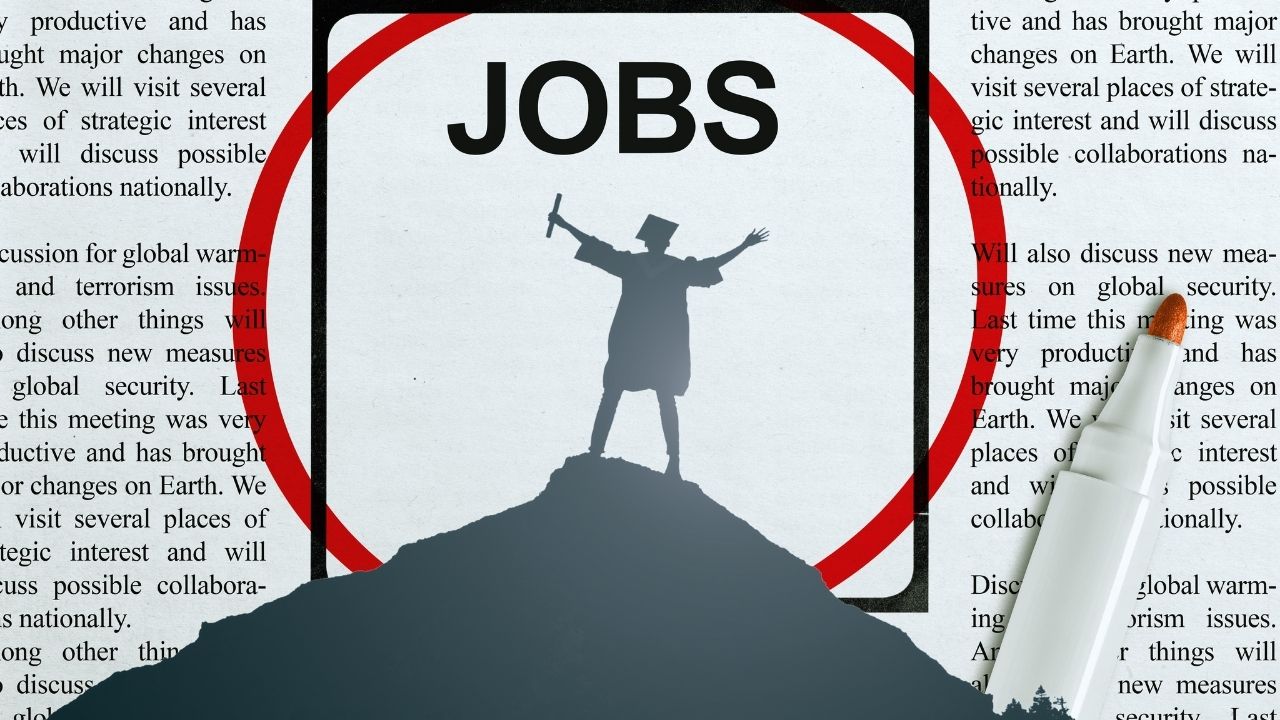- Data from LinkedIn found that 35% of postings for “entry-level” positions asked for years of prior relevant work experience.
- This is making it more difficult for recent college grads to gain a foothold in the labor market.
- Are employers and HR departments asking too much of applicants or are entry-level applicants too inexperienced?
Entry-level jobs used to allow new graduates to enter the workforce, but many of these jobs are now requiring extensive prior experience.
A recent analysis of close to 4 million jobs posted on LinkedIn (since late 2017) showed that 35% of postings for “entry-level” positions asked for years of prior relevant work experience.
Young professionals seeking entry-level jobs are faced with a huge roadblock; companies are asking new graduates to already have years of experience before they even apply for entry-level jobs, making it more difficult for some young adults to gain a foothold in the labor market.
Why can’t inexperienced workers get entry-level jobs?
A recent analysis of over 95,000 job postings by job-matching software firm TalentWorks revealed how difficult it can be for new college grads to find an entry-level job within their experience level.
The research found that 61% of all full-time jobs seeking entry-level employees required at least three years or more of experience.
A recent graduate and job seeker most likely went to college for four years (on average), so they would need to be gaining real-life experience for three of those years in order to qualify for 61% of full-time jobs.
Currently, three years of experience isn’t realistic for entry-level jobs. Universities may need to change their graduation requirements in order to keep up with the labor market’s skill requirements.
Employers/HR departments might have unrealistic expectations when creating job descriptions
Young people entering the job market feel as though they’re supposed to have much more experience than they actually have. Applying for jobs right out of college has proven to be extremely difficult because most jobs require an extensive amount of experience.
There are unrealistic expectations of what one single job should encompass. Often, a job’s description has multiple roles rather than one. For instance, a job listing for a journalist might also list the need for graphic design, video editing, and SEO skills.
Are employers and HR departments asking too much of applicants or are entry-level applicants too inexperienced?
Employers are trying to find entry-level employees who know how to be a successful employee. Unfortunately, an employer doesn’t want their company to be the first place you’ve ever worked. This might leave graduates wondering, “How do I get experience if no one will hire me?”
Why are new job applicants discouraged?
Workers need something more than a college degree to be able to enter the workforce now, whether it’s many internships or previous job experience.
Unfortunately, not everyone has had access to those advantages or have had the time to dedicate to those activities, and the result is that workers are being left behind and struggling to enter the workforce.
In September 2021, there were 450,000 workers categorized as discouraged, an increase from the 392,000 reported in August 2021. Discouraged workers are those who want to work and are available to do so but have dropped out of the labor force because they believe there aren’t any jobs for them.
While this is happening across almost all industries, some specific industries are making it harder for recent grads.
More than 60% of listings on LinkedIn for entry-level software and IT Services jobs required three or more years of experience.
It would seem that entry level jobs for these professions rarely exist – so how are people entering these industries?
The answer might be college-required internships.
Should universities require internships for students to graduate?
Many colleges already do require internship credit for students to graduate, but those that do not might be hindering their students’ success.
By emphasizing, or even requiring relevant jobs and internships as part of the undergraduate experience, colleges set their graduates up to acquire good jobs after graduation in fields where their work is directly relevant to their undergraduate studies.
Higher education institutions are out of sync with what the public and students want most from a college degree.
In this day and age, universities might need to start requiring completed internships for graduation, and to go a step further, perhaps certain courses/theses/projects should count as years of experience in order to assist entry-level graduates in finding their first jobs.
Are internships the new entry level position?
Companies are saving a lot of money by using interns to do the work; the more interns a company has, the fewer entry-level jobs it’s likely to open.
At all four of the Big Four accounting firms (PwC, Deloitte, KPMG, and EY), over 80% of employees have internship experience.
Tech firms also prefer former interns, with 80.2% of recent Facebook workers having done an internship, 78.3% of workers at Google, and 70.1% at IBM.
Since 2013, graduating classes in the U.S. have had at least 60% of students complete an internship or co-op during their time at college.
In 2019, about 40% of interns were unpaid, which was most common in the social services industry.
The way that internships operate is not always ideal.
With such a large portion of them being unpaid, a lot of financially disadvantaged students are weeded out from applying to get the valuable experience. Working for free or for a low wage is simply not feasible for many college students.
Especially in a country where students have to go into massive amounts of debt to pay for college, asking them to work for free to “gain experience” while they could be working for money to pay off debt/expenses is unrealistic.
Should certificates and micro-credentials count as experience for entry-level jobs?
Scott Dettman, CEO of Avenica, a U.S.-based career-matchmaking service for new graduates told the BBC
“Employers are unhappy with the level of talent they’re getting in the entry-level space. So, instead of trying to take corrective action, they’ve increased experience requirements. In the last five years, we’ve seen a 20% increase in the number of skills required on job listings.”
Dettman also said that keeping huge numbers of qualified workers from becoming under-employed will require a bigger paradigm shift, which may mean moving away from one-size-fits-all systems for sorting job applicants, re-evaluating what skills a job really requires, and broadening the definition of relevant experience.
Besides internships, relative experience could include certificates other than a college degree, as well as any other micro-credentials. Micro-credentials are smaller qualifications that a worker can possess that demonstrate skills, knowledge and experience in a specific subject area or capability, which also might be an emerging solution to the skills gap.
Are companies alienating people because of their high expectations?
A large proportion of job postings don’t include a salary range, but expect a vast amount of qualifications from applicants.
When companies list the “x years of experience” requirement, it helps them narrow the job applicant pool. If companies posted entry-level jobs requiring zero experience, they could get flooded with some unqualified applicants.
The definition of entry-level varies from job to job, and some HR departments might feel as though an entry-level applicant should come with some level of experience — even if that’s an internship or a project they were a part of — while others might be more willing to hire someone with no experience.
Companies offering entry-level jobs that require years of experience will most likely not lower their standards, so in order to increase hiring prospects, recent grads will need to obtain more qualifications if they want to land a job.
But not all of the requirements and expectations in job postings are feasible; many are asking for too many years of experience in some technologies that are close to brand-new.
Sebastián Ramírez, creator of FastAPI, tweeted,
“I saw a job post the other day. It required 4+ years of experience in FastAPI. I couldn’t apply as I only have 1.5+ years of experience since I created that thing. Maybe it’s time to re-evaluate that ‘years of experience = skill level.'”
What is the solution?
All of this adds up to an incredibly tough entry-level job market. The inability to land a solid role in a worker’s desired field right out of college can impact their careers and be incredibly discouraging. In fact, 43% of college graduates don’t have a college-level job in their first job after school.
Better hiring practices might focus on an individual’s accomplishments, characteristics, and potential, rather than just the number of years of prior experience or technical skills on their resume.
Employers can define experience as:
- An internship, fellowship, or apprenticeship
- Side gigs or freelance work in your industry
- Skills-based volunteer positions
- Leadership roles within a club or organization
- A semester-long project.
Brian Weed, former CEO of Avenica, believes organizations should base entry-level job postings on required skills and competencies (some of which can be taught) while making it clear that all interested candidates are encouraged to apply.
“Interviewers should ask these candidates for real-life examples of how they applied these skills successfully in a nonprofessional position, volunteer setting or team-oriented activity. These skills are often a more accurate measure of a candidate’s future success than work experience or even a college degree,” Weed told SHRM.



 Dr. Gleb Tsipursky – The Office Whisperer
Dr. Gleb Tsipursky – The Office Whisperer Nirit Cohen – WorkFutures
Nirit Cohen – WorkFutures Angela Howard – Culture Expert
Angela Howard – Culture Expert Drew Jones – Design & Innovation
Drew Jones – Design & Innovation Jonathan Price – CRE & Flex Expert
Jonathan Price – CRE & Flex Expert












